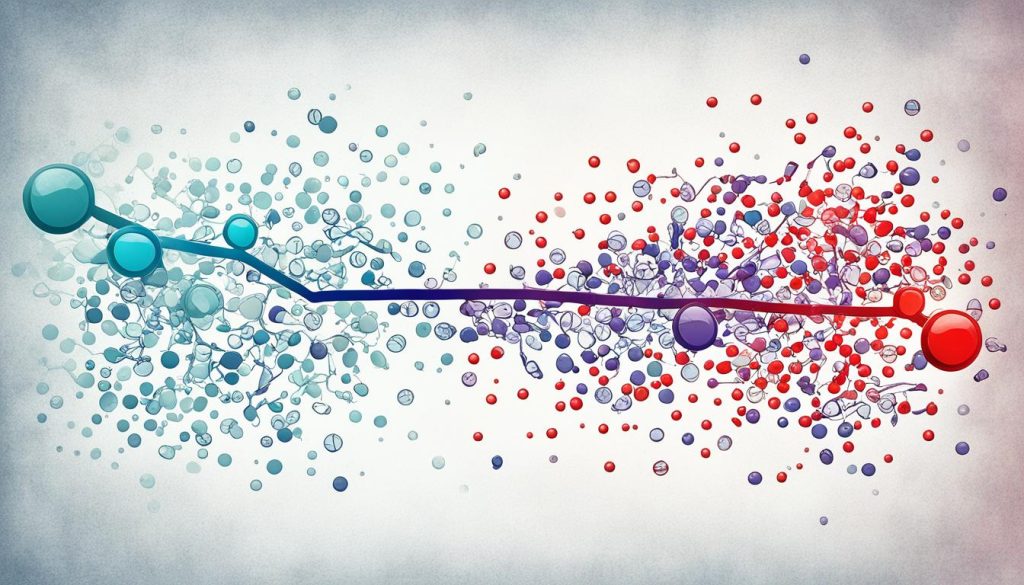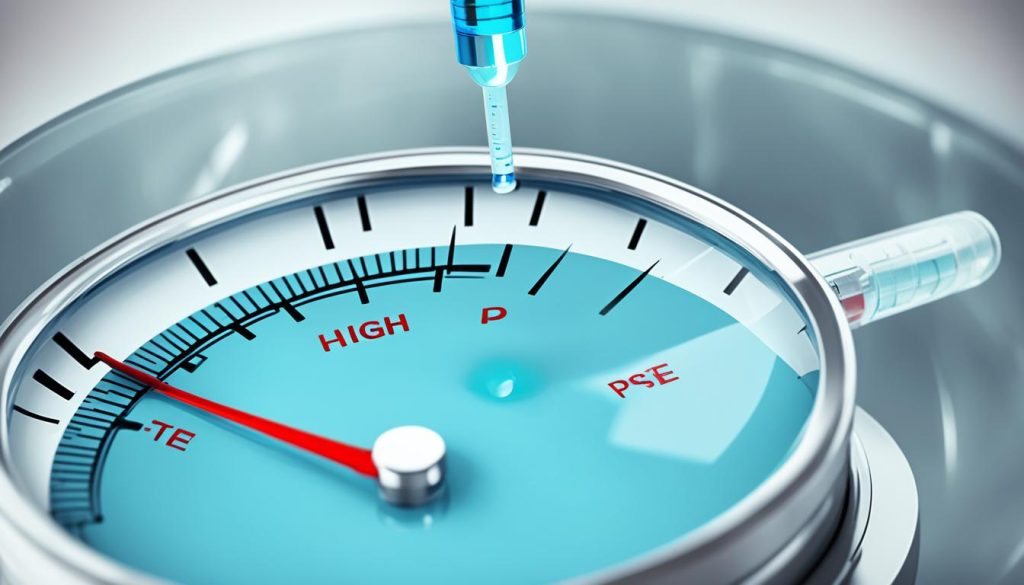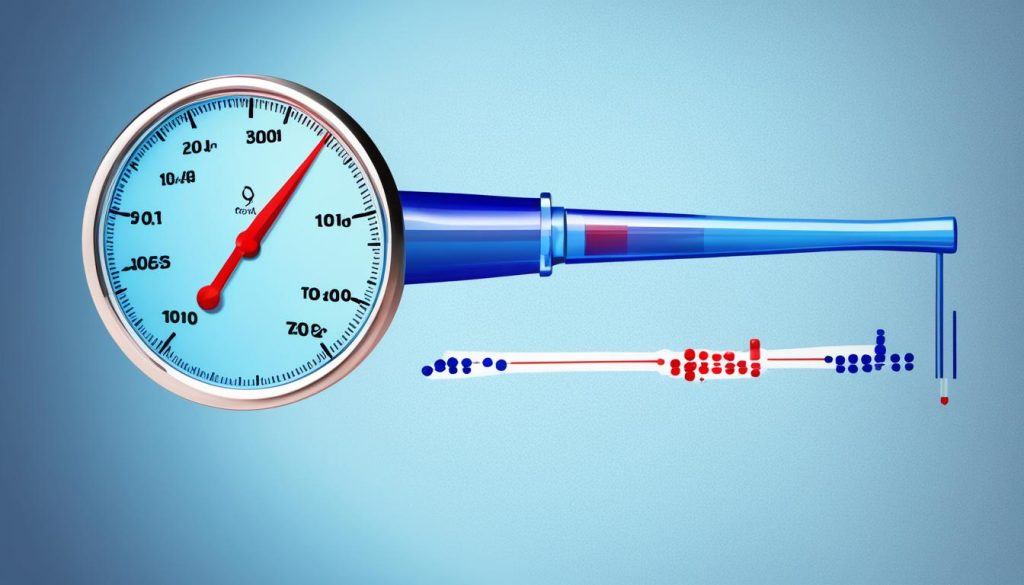Ad Blocker Detected
Our website is made possible by displaying online advertisements to our visitors. Please consider supporting us by disabling your ad blocker.
If you’re among the many navigating the complexities of health as you age, you may have encountered concerns related to high blood pressure and its effects on your body. Perhaps less well-known is the potential influence of this condition on your hormonal balance. Specifically, the idea that can high blood pressure cause low testosterone, commonly called low T, is a topic garnering increasing attention. Hypertension, a medical term for high blood pressure, does more than increase the risk for heart disease and stroke; it could also be linked to your testosterone levels.
Understanding the connection between hypertension and low testosterone is crucial, especially as studies suggest that men with high blood pressure may have a greater chance of experiencing lower levels of this vital hormone. The question at hand is whether the lifestyle factors and physiological changes that lead to high blood pressure are also at play in testosterone production and regulation.
In exploring whether hypertension and testosterone levels are related, you should consider your overall health. Regular health screenings and discussions with your healthcare provider can help pinpoint issues and address them appropriately. With testosterone levels playing a role in everything from libido to muscle mass, acknowledging and investigating the potential links to hypertension is a step forward in preventive health care.
Key Takeaways
- Hypertension may influence testosterone production, leading to lower hormone levels.
- Testosterone levels below 300 ng/dL could be a sign of low T, often associated with high blood pressure.
- Identifying symptoms of low testosterone can help mitigate health risks, including those related to high blood pressure.
- Lifestyle choices and health conditions like metabolic syndrome can impact both blood pressure and testosterone levels.
- Regular check-ups are important to understand and manage the potential impacts of high blood pressure on hormonal health.
- Understanding the role of testosterone in your body can help you take proactive steps towards maintaining cardiovascular and overall health.
Understanding Low Testosterone: Severity and Symptoms
When considering the impacts on one’s health, the mere mention of low testosterone due to high blood pressure can be enough to cause concern. Testosterone deficiency isn’t just about sexual health; it may exacerbate several chronic conditions, including hypertension. Recognizing the symptoms of low T early on can be crucial to mitigating these health risks and maintaining a vigor-filled lifestyle.
What is Low Testosterone?
Low testosterone, or ‘low T’, refers to levels of the testosterone hormone that fall below the threshold necessary for maintaining optimal male health. Affected individuals might experience a range of symptoms, which can be a significant deviation from their standard quality of life. Disruptions in the coordination between the hypothalamus, pituitary gland, and testes could be the underlying cause of such a hormone imbalance.
Common Symptoms: From Low Libido to Muscle Loss
You might be living with symptoms of low T if you are experiencing any of the following: diminished sex drive, challenges with erections, changes in mood or fatigue levels, and a decrease in muscle mass. As you evaluate these signs, it’s imperative to consider the relationship between testosterone deficiency and other health complications, such as high blood pressure.
The Gradual Testosterone Decline: Age-Related Changes
It’s natural for testosterone levels to gradually decrease with age, but for some, the decrease is notably more precipitous. While a 1% annual decline might be expected, anything significantly more can be indicative of a problem and should be addressed with a medical professional.
| Age Range | Average Testosterone Decrease | Potential Symptoms |
|---|---|---|
| 30-40 years | 1% per year | Minor energy variation, mood swings |
| 40-50 years | 1-2% per year | Reduced libido, increased body fat |
| 50+ years | 2-3% per year | Erectile dysfunction, muscle loss, depression |
With these insights, you’re encouraged to reflect on your health and consider whether symptoms of low T could be influencing your well-being, especially in relation to high blood pressure.

Can High Blood Pressure Cause Low Testosterone?
As you delve into the intricacies of men’s health, one query that often arises is the relationship between hypertension and testosterone levels. Scientific research has not yet fully elucidated the direct causality link, but current findings suggest a complicated interplay that could influence your well-being.

Consider the scenario observed more frequently in men with a genetic predisposition to hypertension or those who smoke. Here, low testosterone levels often emerge as a potential indicative marker, hinting at an elevated risk for developing high blood pressure. In essence, a deficiency in testosterone might be sounding the alarm bells for hypertension that could lie ahead.
Yet, there’s a twist in this biological saga. Low testosterone itself could very well be contributing to the cascade of factors leading to high blood pressure. Case in point: metabolic syndrome. This condition bundles together a multitude of health concerns, among which are elevated blood sugar levels, central obesity, and indeed, increased cholesterol—all notorious for cranking up blood pressure gauges.
- **Elevated Blood Sugar:** Adversely affects the balance of insulin and may lead to diabetes, a condition linked with hypertension.
- **Abdominal Obesity:** More than just a belt size issue, it represents a significant risk factor for both hypertension and low testosterone.
- **High Cholesterol:** When left unchecked, can pave the way for atherosclerosis and increased blood pressure.
Understanding this dual relationship is crucial, as it raises important considerations about prevention and potential treatment options.
Indeed, the effects of hypertension on testosterone cannot be overlooked as a mere coincidence. What becomes apparent is a need for a more holistic approach to managing these intertwined conditions, balancing lifestyle changes with medical insight.
The table below summarizes key points illustrating how low testosterone levels and high blood pressure possibly influence one another, reflecting the latest in scientific understanding.
| Testosterone Level | Impact on Hypertension Risk | Associated Conditions |
|---|---|---|
| Low ( | Potential Marker for Hypertension | Metabolic Syndrome, Obesity, High Cholesterol |
| Normal to High | Lowers Hypertension Risk | Healthier Metabolic Profile |
Crucially, the discussion here is far from academic. It is intended to empower you with the knowledge to engage more effectively with healthcare professionals and take charge of your health destiny.
Exploring Hypertension’s Influence on Testosterone Levels
As we delve into the complex relationship between hypertension and hormone levels, it’s important for you to understand how your blood pressure may be silently influencing your hormonal health. The intricate dance between these two critical aspects of physiological well-being cannot be overlooked in the pursuit of optimal health.
Hypertension and Testosterone: What Research Shows
Groundbreaking studies have consistently demonstrated a link between high blood pressure and low testosterone. Men with hypertension often display testosterone levels that are lower than those of their normotensive counterparts. Remarkably, this correlation holds even when considering age and body mass index as confounding factors. What could this mean for your overall health? Well, the implications are significant, as testosterone plays a pivotal role in various bodily functions beyond just reproductive health.

The Interplay Between High Blood Pressure and Hormonal Health
While we delve into how hypertension could lead to low testosterone, it’s essential to note that other hormones such as estrogen or sex hormone-binding globulin have not demonstrated the same consistent patterns in relation to blood pressure. This fortifies the unique connection between testosterone and blood pressure, suggesting a more targeted impact of hypertension on this specific hormone. As research progresses, we hope to uncover the precise mechanisms by which this interaction occurs and identify potential avenues for intervention.
Comorbidity Concerns: Hypogonadism and Cardiovascular Health
As you explore the impact of hypogonadism on health, it’s critical to acknowledge the dual challenge presented by low testosterone and cardiovascular conditions. These interlinked issues can compound each other, raising concerns for individuals dealing with both. Specifically, there is a noteworthy interaction between hypertension and low testosterone levels that warrants careful consideration.
Hypertension as a Symptom or Contributor to Low T
When considering the intricate relationship between these elements, it’s possible to see hypertension not just as a standalone issue, but as a contributing factor to low testosterone in some cases. By recognizing the symptoms and addressing hypertension and low testosterone levels concurrently, you may find a more holistic approach to managing your overall health.
Understanding Metabolic Syndrome in Relation to Testosterone Deficiency
Metabolic syndrome is a cluster of conditions that occur together, significantly increasing the risk of heart disease, stroke, and diabetes. Low testosterone is often observed alongside metabolic syndrome, sparking discussions on the role of hormonal balance in metabolic health. Let’s delve into how this hormone relates to broader health concerns.
| Component of Metabolic Syndrome | Effect on Testosterone Levels | Risk Associated with Low Testosterone |
|---|---|---|
| High Blood Pressure | May reduce testosterone production | Increased risk of cardiovascular disease |
| High Blood Sugar | Can lead to insulin resistance, affecting hormone levels | Elevated chance of diabetes |
| Abdominal Obesity | Fat cells convert testosterone to estrogen | Amplified obesity and related health issues |
| High Cholesterol | Negative impact on hormonal balance | Possibly reduced capacity to mitigate cardiovascular risks |
| Insulin Resistance | Associated with lower testosterone levels | Further progression of metabolic syndrome |
By better understanding the intersections between metabolic syndrome and low testosterone, you are empowered to take steps that may not just alleviate the symptoms of low T, but also improve metabolic health — a dual benefit that should not be overlooked.
The Role of Lifestyle: Obesity’s Impact on Testosterone
If you’re worried about the effects of hypertension on testosterone, understanding the impact of obesity is essential. Being overweight can play a significant role in increasing your risk of developing high blood pressure, which in turn, can have a profound influence on testosterone levels. However, the effects extend both ways.
Navigating Weight Management to Optimize Hormonal Levels
Fat accumulation, particularly around the waist, isn’t merely an aesthetic concern—it’s a health issue with hormonal ramifications. As you gain weight, your body’s ability to produce testosterone may decline, resulting in a frustrating cycle where low testosterone promotes further weight gain, establishing a challenging cycle of hormonal imbalance and obesity.
However, there’s good news. By engaging in weight management strategies, such as regular physical activity and dietary modifications, you can interrupt this cycle. The benefits of shedding excess pounds seem to rekindle the hormonal fires, as weight loss is associated with an increase in testosterone levels. And, as your waistline shrinks and your health improves, you may also notice a decrease in high blood pressure impacts on testosterone.

The Vicious Cycle: Obesity, Diabetes, and Hormonal Imbalance
Obesity doesn’t just impact your body’s testosterone production—it’s also a herald of diabetes, a condition known to exacerbate the issue. Insulin resistance is common in obese individuals, signaling the onset of type 2 diabetes, which further disrupts the delicate balance of hormones in your body. Key to breaking free from this chain is to recognize the interconnected nature of these health concerns.
| Health Condition | Effects on Testosterone Levels | Impacts on Blood Pressure |
|---|---|---|
| Obesity | Decreased testosterone production | Risk for high blood pressure |
| Type 2 Diabetes | Increased insulin resistance, lower testosterone | Can lead to hypertension |
| High Blood Pressure | Lower testosterone levels observed in hypertensive individuals | Further aggravated by obesity and diabetes |
Underpinning this trifecta is the reality that adopting a healthier lifestyle could have a ripple effect, improving not just your weight but also your testosterone levels and blood pressure. So, taking control of one aspect of your health can positively impact others, creating a beneficial cycle of wellness in place of the vicious one you may be experiencing now.
Testosterone Replacement Therapy: Benefits and Considerations
When faced with the multifaceted issues of hypogonadism, you might explore the avenue of testosterone replacement therapy (TRT). This treatment has surfaced as a prominent option for low testosterone treatment, with the potential to alleviate undesirable symptoms and fortify your health. The efficacy of TRT in addressing issues such as erectile dysfunction and diminished libido has been well-documented, and for those distressed by the symptoms of low testosterone, it can be a transformative approach.
Treatment Options: Evaluating the Efficacy of TRT
Delving into the advantages of testosterone replacement therapy, many individuals discover noteworthy improvements in their quality of life and symptomatic relief. With the aptitude to assuage symptoms and possibly endorse weight loss, TRT appears as a beacon of hope, especially when traditional lifestyle modifications fail to yield your desired outcomes. However, TRT’s role in directly combating conditions like metabolic syndrome is limited and emphasizes the critical nature of a comprehensive treatment strategy.
Risks Vs. Rewards: When Is TRT Advisable?
Nevertheless, your health journey must consider the facets of TRT side effects, including an elevated risk of heart disease. Therefore, careful contemplation is essential, with a strong recommendation to engage in thorough discussions with a healthcare professional. TRT, while not a panacea for metabolic concerns, could offer a tailored solution for specific cases of low testosterone. Always remember, your informed decision, coupled with expert guidance, lays the groundwork for the optimal management and enhancement of your well-being.
FAQ
Can high blood pressure cause low testosterone?
While high blood pressure itself hasn’t been conclusively shown to cause low testosterone, researchers have found a connection between hypertension and lower testosterone levels. More studies are needed to understand the relationship fully.
What is low testosterone, and how severe can it be?
Low testosterone, or hypogonadism, is a condition where the body doesn’t produce enough testosterone. Levels below 300 ng/dL are generally considered low. It can range from mild to severe, potentially affecting health, mood, and physical function.
What are the common symptoms of low testosterone?
Symptoms can include low libido, erectile dysfunction, fatigue, weight gain, muscle loss, mood changes, and depression among others.
Does testosterone naturally decline with age?
Yes, testosterone levels typically decrease about 1% per year from adulthood onwards, but the rate can vary among individuals.
What does research suggest about the relationship between hypertension and testosterone levels?
Research suggests a link between hypertension and lower testosterone levels. However, whether one causes the other or they share common health determinants is still under investigation.
Could low testosterone contribute to high blood pressure?
Low testosterone may contribute to conditions like metabolic syndrome, which includes high blood pressure among various other health issues. However, causation has not been definitively established.
Are hypertension and low testosterone levels related health issues?
Men with hypogonadism or low testosterone tend to have a higher likelihood of health conditions like high blood pressure, but additional research is needed to elucidate whether there’s a direct causal relationship.
How does obesity impact testosterone levels?
Obesity can lead to lower levels of testosterone by converting it to estrogen and by reducing sex hormone-binding globulin (SHBG), which can decrease free testosterone levels.
Is testosterone replacement therapy (TRT) a viable treatment for low testosterone?
TRT may be prescribed for significant symptoms of low testosterone that adversely affect quality of life, but it must be considered with caution and under medical supervision due to potential health risks.
What are the risks and rewards of TRT?
TRT can alleviate symptoms of low T and improve quality of life but is associated with potential risks like an elevated chance of heart disease. Balancing benefits and risks with medical guidance is crucial.
Does Low Testosterone Contribute to High Blood Pressure?
Low testosterone and premature ejaculation connection may be linked to high blood pressure. Research suggests that low testosterone levels can lead to various health issues, including high blood pressure. It is essential to address these hormone imbalances to maintain overall well-being.


